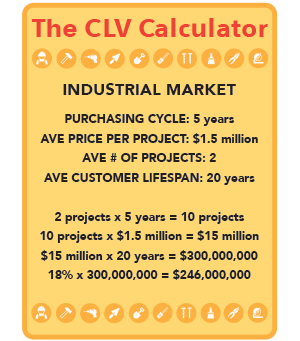Is construction marketing CLV important?
Customer Lifetime Value (CLV), a calculation of the value of the lifetime value of a customer to your company, is essential to many industries. For example, a manufacturer that produces parts or equipment understands how much a long-term customer means to its future revenues. However, does CLV in construction marketing matter? After all, the customers of a construction company do not make yearly purchases. I think that it is essential for construction companies to determine construction marketing CLV for several reasons. In this blog, I will cover those reasons.
Construction Marketing CLV does exist
First of all, every construction company that I have worked with gets repeat business. Now, I don’t believe those construction marketing clients were just exceptionally lucky. Instead of relying on good fortune, they completed the build as promised and maintained good relationships with clients – more on that later. When reviewing construction marketing CLV, you need to look at each market you work in separately. This approach will allow you to calculate an average CLV for each market, whether its medical, education, retail, or industrial.
Construction Marketing CLV helps with planning
Because you have determined the average CLV of each market, you have valuable information to improve your marketing planning accuracy. With this factor in mind, let’s look at how you can utilize CLV in construction marketing. To begin, it helps you decide which markets to emphasize in your sales and marketing efforts. To clarify, let’s say you find that the industrial market has more repeat business because of frequent additions or renovations. Now you know to pursue that market more vigorously than the church market, which only has projects once or twice in a decade or more.
Cnstruction marketing CLV allows you to understand the true ROI of your marketing program. Often, construction clients only look at yearly returns or what projects are in the pipeline. By knowing the average CLV, you will soon realize that ROI needs to be a long-term view, especially concerning the cost of acquiring a customer. Taking this perspective means you make better use of marketing budgets and establish more accurate sales goals.

Making Construction Marketing CLV work
In general, happy customers mean you will build a good reputation and earn more business. However, achieving these relationships takes more than completing the project satisfactorily. To grow construction marketing CLV, you need to have a program where you keep in regular contact with customers. Our agency helps construction clients accomplish this through programs that include social media, direct mail, and e-blasts. These programs assure you are at the forefront when a client needs construction services.
How to calculate Construction Marketing CLV
Finally, after all this talk about CLV in construction marketing, you should know how to calculate it. Here are the steps to calculate the average CLV for an individual market.
One: Set an amount for the purchasing cycle you will use for the CLV calculation (The number of times a client uses your services in a set number of years)
Two: Review several projects within the market to come up with an average price per project.
Three: Determine the average number of projects within the established purchasing cycle.
Four: Review your customer history to determine the average time a customer stays with your company of their lifespan.
Five: Multiply the average cost per project by the number of projects within the purchasing cycle.
Six: Multiply that number by the average lifespan of a client. Now you have the average CLV of that market.
Seven: Take your average profit margin for this market out of the CLV to further refine the CLV.
To sum up, construction marketing CLV is viable and valuable. It helps you to realize which markets generate the most sales, shows you the real return on your sales and marketing, and demonstrates why you need to value every customer.
About the Author
Paul Kowalski (or Pappy as he is called around the office) spent over two decades working at other agencies before opening Conach Marketing Group in 2008. The early part of his career was working with Fortune 500 clients at different agencies. However, working with smaller clients was his preference. This choice was because of the impact on a client’s business growth and forming closer, personal relationships.
About Conach
When he was creating Conach, his goal was to bring those Fortune 500 strategies along with years of B2B marketing experience to small business marketing clients. As a result of focusing on business to business marketing, Conach specializes in construction marketing, financial marketing, and industrial marketing. Even though we are in Mid-Michigan, Conach provides marketing services to clients across the country.
For more information visit conachmarketing.com or contact us or call 989.401.3202.

